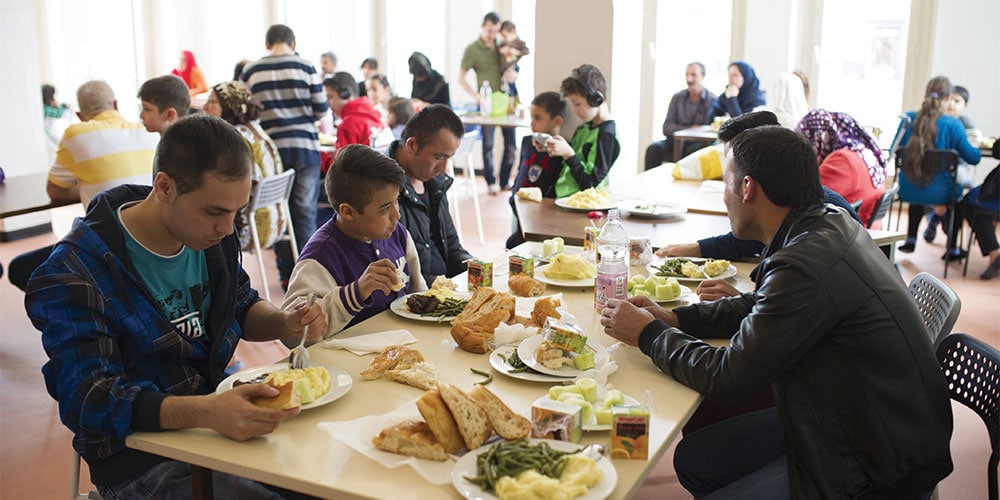
I work professionally as a caterer, and one of the tasks is the delivery of lunch meals to schools. Toward the end of the summer holidays in 2015 my boss asked me and my coworkers if we would volunteer to participate in food distribution to refugees. About 150 refugees who needed to be fed were soon to be accommodated in the school gym of our town Bergheim/Erft in North Rhine-Westphalia, Germany. Help was needed in the evenings and on weekends. As an early riser, I agreed to help with the preparation and delivery of breakfast on Sundays.
The refugees—which included many children and elderly people—had gone through terrible experiences. As helpers, we particularly noticed five young men who were exceptionally polite and had soon learned to say, “Good morning. How are you?” in German. Two of them were brothers, along with their cousin from Iran. They had been joined by two men from Syria.
One Sunday my family and I invited the five men to our home after lunch. They sat in our living room on the sofa, and we asked them many questions about life in their home countries, and about their flight to Germany. Afterward we had fun playing board games. For dinner we wanted to order pizza for all of us, but they politely declined. Instead, they prepared a wonderful meal for us from ingredients and leftovers we had on hand in the house. It was a great evening!
Five days later my family and I were celebrating my birthday and invited the five young men to join us. Three of them came; the other two were attending the Muslim feast of Eid-el-Kabir (“Feast of the Sacrifice”). As part of the birthday celebration I had also invited some friends from the local Adventist church. One of the young men, Hemin,* a Kurd from Iran, talked to a couple from our church. Their conversation turned to religion. Although he had grown up in a Muslim country, Hemin identified himself as an atheist. For him, the Muslim faith was out of the question.
After a certain period of time of staying in the initial reception facility, newly arrived refugees are relocated throughout Germany. Hemin had to move to a small village called Uedem. It lies northeast of the Ruhr area, the largest industrial region in Germany, not far from the border with the Netherlands. In the next larger town, Kevelaer, there is an Adventist church. Since I personally know Christiane, the wife of the local pastor there, I asked her to look after Hemin. At the same time I kept in touch with him through social media. From Christiane I learned that Hemin was regularly attending the worship services, that he was very comfortable in the church, and that he had even begun to pray.
The North Rhine-Westphalian Conference, to which we belong, organizes a Friendship Camp once a year. This camp meeting is intended for church members and their non-Adventist friends. There are recreational activities such as games and excursions, but also spiritual programs. This allows interested people to learn about the Adventist faith and church in an informal environment. I decided to invite Hemin to Friendship Camp.
Meanwhile, Hemin’s brother, Amez, arrived in Germany from Iran. He was assigned accommodation in a small village near Oldenburg, in northern Germany. Amez had been severely tortured in Iran and has suffered from schizophrenia ever since. In order to live near his brother, Hemin applied to the appropriate authorities to move to the same place, and his request was granted. I contacted the pastor of the Adventist church in Oldenburg and asked him to take care of Amez, which he did. I then also invited Amez to Friendship Camp. Although both brothers now lived in another federal state (Lower Saxony), the North Rhine-Westphalian Conference agreed to pay for their camp costs. I took care of the costs of their train travel.
On July 20, 2016, Friendship Camp started, and I picked up Hemin and Amez from the train station. I was startled when I first saw Amez because his face was marked by torture scars. He had already had 10 operations, but the injuries were still visible.
Friendship Camp proved to be a great blessing for the brothers, especially for Hemin. The very reserved Amez, though, gradually warmed up and took part in all the programs. At the end of the camp meeting when a person was baptized, it moved Hemin to entrust his life to God. Sometime later he told me that he wanted to be baptized. Amez also occasionally attends services at the Adventist church in Oldenburg.
What would have happened if I had not followed “God’s voice” and had not volunteered for the food distribution in the refugee shelter? What would have happened if I had not invited the five men to our home? What would have happened if the Adventist churches in Kevelaer and Oldenburg had not looked after Hemin and Amez?
Sure, God has a thousand ways to work that we know not of. But I am proud of the wonderful spiritual family of Adventism. Although I did not personally know most of my brothers and sisters of faith in the other places but contacted them only through social media and telephone, they opened their hearts, and together we we were able to help people who had been persecuted in their home countries to find a new spiritual home.
*Names in this article have been changed.
Birgit Brackmann is a member of the Adventist church in Bergheim/Erft in North Rhine-Westphalia, Germany. She and her husband have two adult children.